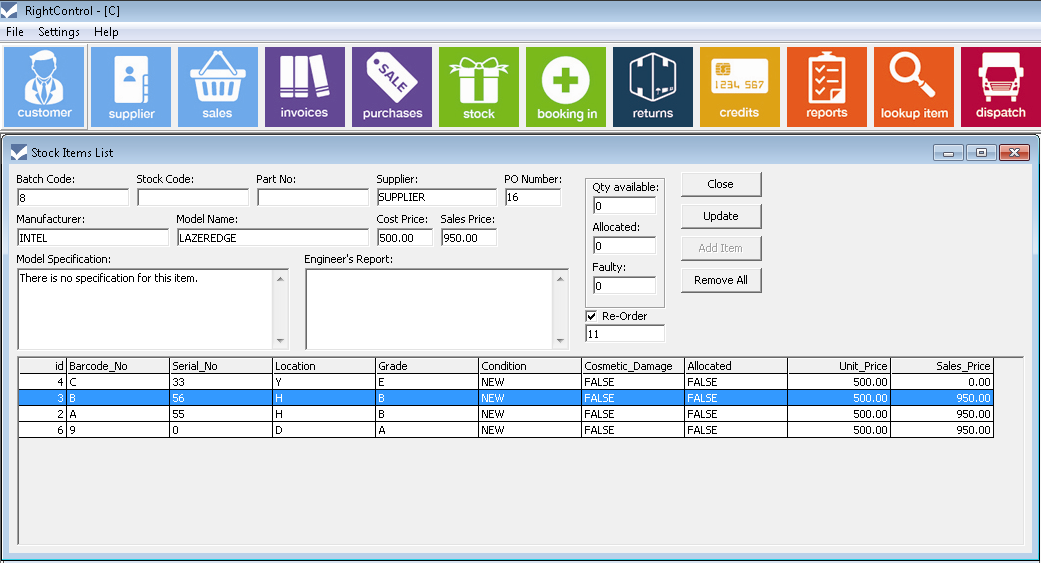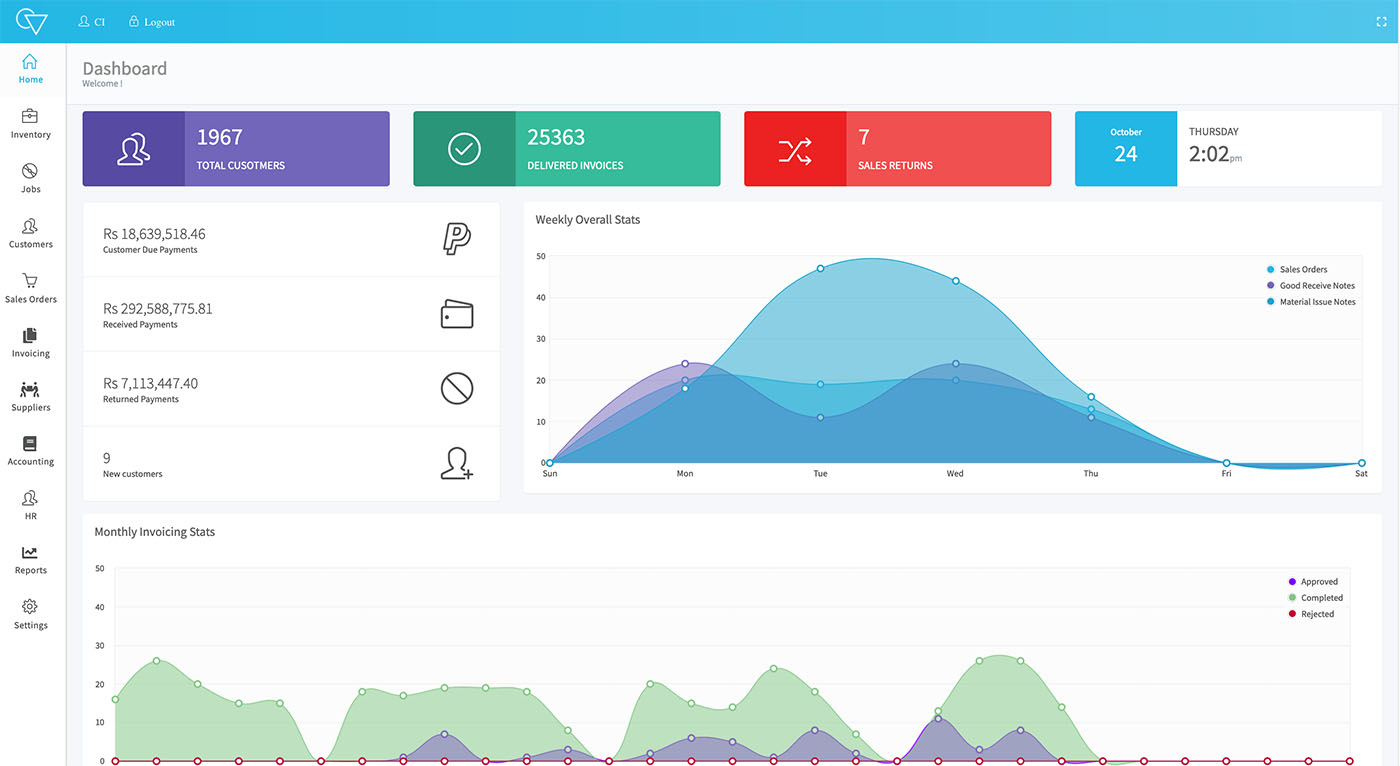Cloud inventory management software for small businesses is revolutionizing the way small businesses manage their inventory. With its real-time tracking, multi-location support, and reporting capabilities, cloud-based inventory management software is helping small businesses streamline their operations, reduce costs, and make better decisions.
In this article, we will explore the key features and benefits of cloud inventory management software for small businesses. We will also provide guidance on choosing and implementing the right software for your business.
Key Features of Cloud Inventory Management Software

Cloud-based inventory management software offers several advantages for small businesses, including:
- Real-time tracking: Monitor inventory levels in real-time, ensuring accurate stock counts and preventing overstocking or shortages.
- Multi-location support: Manage inventory across multiple locations, providing a consolidated view and streamlining operations.
- Reporting capabilities: Generate detailed reports on inventory performance, helping businesses analyze trends, identify inefficiencies, and make informed decisions.
Core Features
Key features of cloud inventory management software include:
- Centralized database: Stores all inventory data in a single, secure location, accessible from any device with an internet connection.
- Automated inventory updates: Automatically updates inventory levels based on sales, purchases, and other transactions, eliminating manual data entry and errors.
- Mobile access: Allows users to manage inventory on the go, using smartphones or tablets.
- Integration with other systems: Seamlessly integrates with accounting, CRM, and e-commerce platforms, streamlining data sharing and improving efficiency.
- Customization: Tailored to specific business needs, allowing businesses to configure the software to match their unique requirements.
Benefits of Using Cloud Inventory Management Software
Cloud-based inventory management software offers numerous advantages for small businesses, streamlining operations, reducing costs, and empowering data-driven decision-making.
Improved Efficiency
- Automated inventory tracking reduces manual errors and saves time spent on manual counting and data entry.
- Real-time inventory visibility enables quick and accurate order fulfillment, minimizing delays and improving customer satisfaction.
- Integration with other business systems, such as accounting and e-commerce platforms, streamlines data flow and eliminates the need for manual data transfer.
Reduced Costs
- Cloud-based software eliminates the need for expensive on-premises servers and IT infrastructure, reducing hardware and maintenance costs.
- Automated inventory management reduces the risk of overstocking or understocking, minimizing waste and maximizing inventory turnover.
- Improved efficiency leads to reduced labor costs, as employees can focus on more value-added tasks.
Enhanced Decision-Making
- Detailed inventory analytics provide insights into inventory trends, demand patterns, and stock levels, enabling data-driven decision-making.
- Real-time inventory data helps businesses optimize stock levels, avoid shortages, and identify opportunities for growth.
- Improved visibility into inventory performance allows businesses to make informed decisions about product mix, pricing, and marketing strategies.
Considerations for Choosing Cloud Inventory Management Software
Selecting the right cloud inventory management software for your small business requires careful consideration. Several key factors play a crucial role in ensuring the software aligns with your specific needs and goals.
Consider the following factors when making your decision:
Scalability
Choose software that can accommodate your current inventory size and has the capacity to grow as your business expands. Scalability ensures your software can handle increasing inventory levels and transaction volumes without compromising performance.
Integration Capabilities, Cloud inventory management software for small business
Integration with your existing systems, such as accounting, e-commerce, and CRM, is essential for streamlining operations and eliminating manual data entry. Ensure the software offers seamless integration with your critical business applications.
Customer Support
Reliable customer support is crucial for resolving any issues promptly and minimizing downtime. Look for software providers who offer dedicated support channels, such as phone, email, and live chat, with knowledgeable and responsive representatives.
Implementation and Best Practices
Effectively implementing cloud inventory management software is crucial for optimizing your inventory management processes. Here’s a guide to help you achieve a successful implementation and adopt best practices for improved inventory management.
Begin by carefully planning your implementation, ensuring that the software aligns with your specific business needs and processes. This includes defining clear roles and responsibilities, establishing data import procedures, and setting up automated workflows to streamline operations.
Regular Inventory Audits
Regular inventory audits are essential for maintaining data accuracy and ensuring that your inventory records match the physical stock on hand. Establish a schedule for conducting audits and assign responsibility to specific individuals within your team.
Data Accuracy
Accurate data is the foundation of effective inventory management. Implement data validation processes to ensure that all inventory information entered into the system is correct and consistent. Train your staff on proper data entry techniques and establish clear guidelines for data management.
Staff Training
Comprehensive staff training is crucial for successful implementation and adoption of cloud inventory management software. Provide thorough training on the software’s features and functionalities, ensuring that your team understands how to use the system effectively.
Case Studies and Success Stories: Cloud Inventory Management Software For Small Business

Cloud inventory management software has empowered numerous small businesses to streamline their operations and achieve remarkable growth. Here are some compelling case studies that illustrate the transformative impact of these solutions:
A small manufacturing company faced challenges in managing its inventory across multiple warehouses. The manual processes led to frequent errors, delays, and stockouts. After implementing a cloud inventory management software, the company gained real-time visibility into its inventory levels, automated inventory tracking, and improved communication among warehouses. This resulted in reduced stockouts, optimized inventory levels, and increased operational efficiency.
Increased Sales and Customer Satisfaction
A retail store experienced difficulties in meeting customer demand due to stock shortages and inefficient inventory management. By adopting cloud inventory management software, the store gained access to real-time inventory data, enabling them to fulfill orders accurately and on time. The improved inventory management also allowed the store to optimize pricing and offer better discounts, leading to increased sales and improved customer satisfaction.
Future Trends and Innovations

Cloud inventory management software is continuously evolving to meet the changing needs of small businesses. Emerging trends and innovations in this field include:
– Artificial Intelligence (AI) and Machine Learning (ML): AI and ML algorithms are being integrated into cloud inventory management software to automate tasks, improve forecasting accuracy, and optimize inventory levels. This can lead to significant cost savings and efficiency gains for small businesses.
Advanced Analytics and Reporting
– Cloud inventory management software is increasingly offering advanced analytics and reporting capabilities. This allows small businesses to gain deeper insights into their inventory data, identify trends, and make better decisions about their inventory management strategies.
Integration with Other Business Systems
– Cloud inventory management software is becoming more tightly integrated with other business systems, such as accounting software, CRM systems, and e-commerce platforms. This integration can streamline operations, reduce errors, and improve overall business efficiency.
Mobile Accessibility
– Cloud inventory management software is increasingly being accessed via mobile devices. This allows small business owners and employees to manage their inventory on the go, from anywhere with an internet connection.
These advancements in cloud inventory management software can further benefit small businesses in the future by:
– Reducing costs: AI and ML can help small businesses reduce costs by automating tasks and optimizing inventory levels.
– Improving efficiency: Advanced analytics and reporting can help small businesses improve efficiency by providing deeper insights into their inventory data.
– Increasing sales: Integration with other business systems can help small businesses increase sales by streamlining operations and reducing errors.
– Improving customer satisfaction: Mobile accessibility can help small businesses improve customer satisfaction by allowing them to manage their inventory on the go and respond to customer inquiries quickly.
Ending Remarks
Cloud inventory management software is an essential tool for small businesses that want to streamline their operations, reduce costs, and make better decisions. By choosing the right software and implementing it effectively, small businesses can gain a competitive advantage and achieve success in today’s competitive market.
Q&A
What are the benefits of using cloud inventory management software?
Cloud inventory management software offers a number of benefits for small businesses, including improved efficiency, reduced costs, and enhanced decision-making.
How do I choose the right cloud inventory management software for my business?
When choosing cloud inventory management software, it is important to consider factors such as scalability, integration capabilities, and customer support. You should also choose software that aligns with the specific needs and goals of your business.
How do I implement cloud inventory management software effectively?
To implement cloud inventory management software effectively, it is important to follow best practices such as regular inventory audits, data accuracy, and staff training.